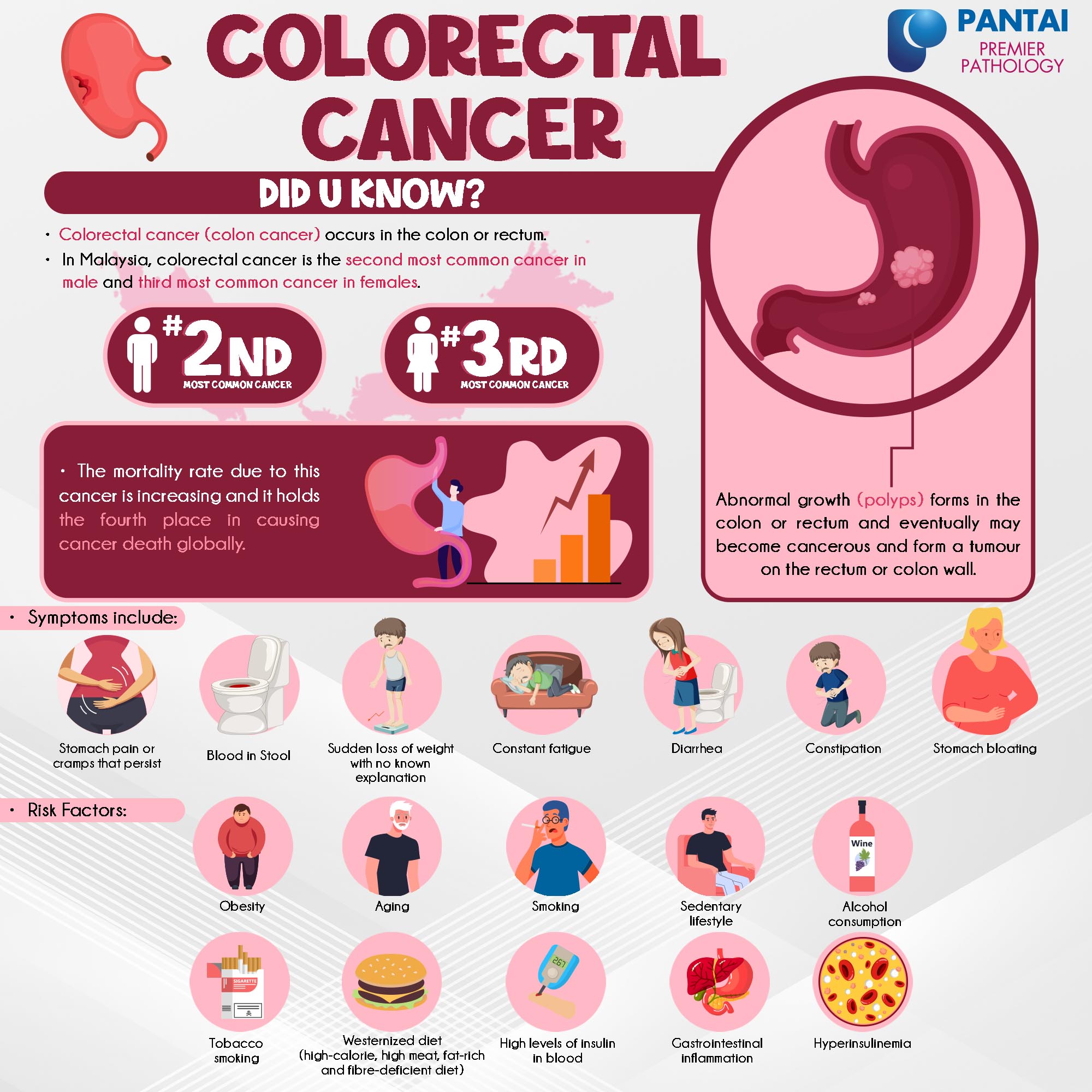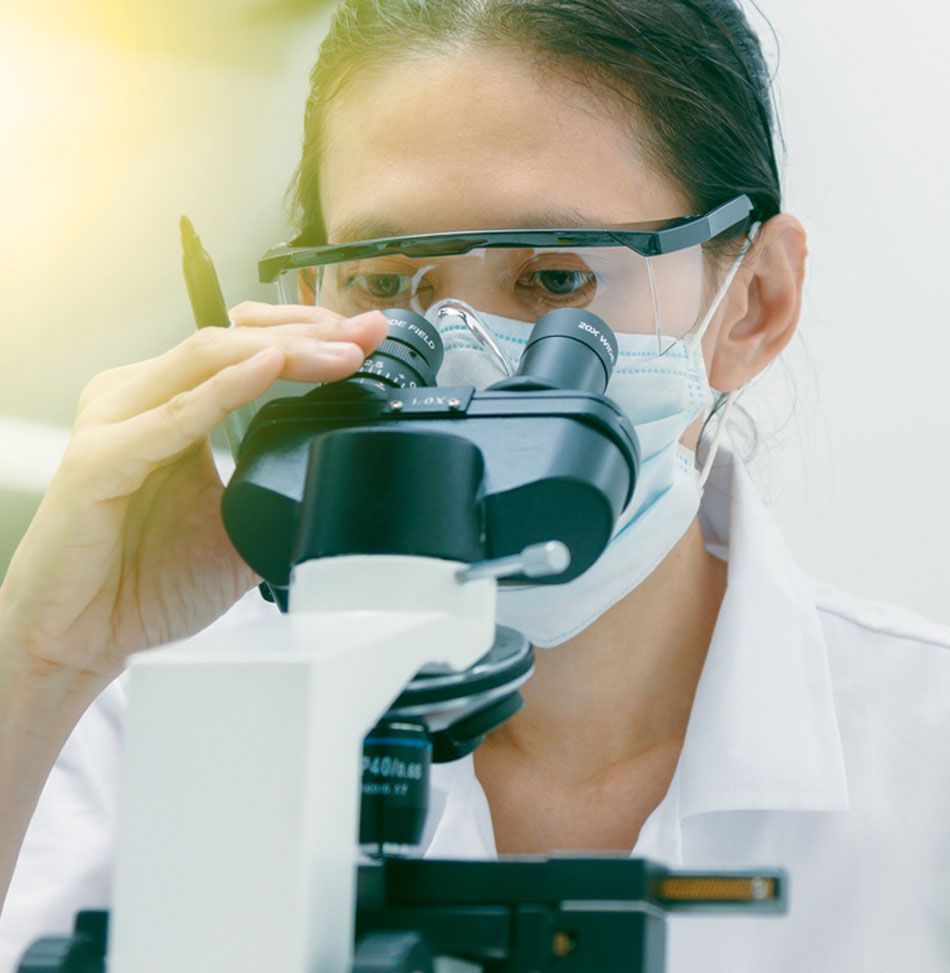What do you need to know about Colorectal Cancer?
Colorectal cancer, also called colon cancer, occurs in the colon or rectum.1 In Malaysia, colorectal cancer is the second most common cancer in male and third most common cancer in females. The mortality rate due to this cancer is increasing and it holds the fourth place in causing cancer death globally.2, 3, 4
The colon is the large intestine or large bowel, whereas, the rectum is the passageway that connects the colon to the anus.1, 5 Abnormal growth, known as polyps, sometimes forms in the colon or rectum. Overtime, some polyps eventually may become cancerous and form a tumour on the rectum or colon wall and subsequently grow into blood vessels or lymph vessels which increases the metastasis rate to other anatomical sites.1, 5, 6, 7
Most cancers of the colorectal region are classified as adenocarcinomas (the mucus producing glands lining the colon and rectum). Other less common colorectal cancers are carcinoid tumours (which forms in intestinal cells that produce hormones), gastrointestinal stromal tumours (which forms in specialised colonic cells), lymphomas (immune system cancers that forms in the colorectal region) and sarcomas (which forms in the blood vessels or occasionally on colorectal walls). 5, 6, 7
Colorectal polyps and cancer do not always cause symptoms upon onset. When symptoms occur, they may include stomach pain or cramps that persist, blood in stool, sudden loss of weight with no known explanation, constant fatigue, diarrhea, constipation and stomach bloating.7, 8
Some common factors that increase the risk of colorectal cancer are obesity, aging, smoking, sedentary lifestyle, alcohol consumption, tobacco smoking, westernized diet (high-calorie, high meat, fat-rich and fibre-deficient diet), high levels of insulin in blood, gastrointestinal inflammation and hyperinsulinemia.3, 4, 7, 9, 10, 11
Screening regularly to detect polyps at an early stage, especially when it is asymptomatic is important to prevent them from turning into cancer or to detect cancer early in order to start treatment when it works best.1
At Pantai Premier Pathology, we provide screening tests related to Colorectal Cancer. Here are some tests related to colorectal cancer offered by Pantai Premier Pathology:
- Fecal Occult Blood Test (FOBT)
- Tumour marker – CEA Test (Carcinoembryonic Antigen)
For more information on the tests provided, please contact us at +603-42809115 (Customer Service) or email us at info@premierpathology.com.my.
References:
- What is Colorectal Cancer? (n.d.). Centers for Disease Control and Prevention. Retrieved October 8, 2020, from https://www.cdc.gov/cancer/colorectal/basic_info/what-is-colorectal-cancer.htm
- Veettil, S. K., Lim, K. G., Chaiyakunapruk, N., Ching, S. M., & Hassan, M. R. A. (2017). Colorectal cancer in Malaysia: Its burden and implications for a multiethnic country. Asian journal of surgery, 40(6), 481-489.
- GLOBOCAN 2018. (2018, September 12). UICC, Global Cancer Control. https://www.uicc.org/news/new-global-cancer-data-globocan-2018#:~:text=GLOBOCAN%202018%20is%20an%20online,for%20all%20cancer%20sites%20combined.
- Ministry of Health Malaysia. (2019). Malaysia National Cancer Registry 2012- 2016 (5). Retrieved from https://drive.google.com/file/d/1BuPWrb05N2Jez6sEP8VM5r6JtJtlPN5W/view
- Marley, A. R., & Nan, H. (2016). Epidemiology of colorectal cancer. International journal of molecular epidemiology and genetics, 7(3), 105–114.
- What is Colorectal Cancer?. (n.d.). American Cancer Society. Retrieved October 9, 2020, from https://www.cancer.org/cancer/colon-rectal-cancer/about/what-is-colorectal-cancer.html
- Colorectal Cancer: Introduction. (2019). American Society of Clinical Oncology (ASCO). Retrieved October 13, 2020, from https://www.cancer.net/cancer-types/colorectal-cancer/introduction
- What Are the Symptoms of Colorectal Cancer? (n.d.). Centers for Disease Control and Prevention. Retrieved October 14, 2020, from https://www.cdc.gov/cancer/colorectal/basic_info/symptoms.htm
- Sung, J. J. Y., Ng, S. C., Chan, F. K. L., Chiu, H. M., Kim, H. S., Matsuda, T., … & Reddy, N. (2015). An updated Asia Pacific Consensus Recommendations on colorectal cancer screening. Gut, 64(1), 121-132.
- Center, M. M., Jemal, A., Smith, R. A., & Ward, E. (2009). Worldwide variations in colorectal cancer. CA: a cancer journal for clinicians, 59(6), 366-378.
- What Are the Risk Factors for Colorectal Cancer? (n.d.). Centers for Disease Control and Prevention. Retrieved October 14, 2020, from https://www.cdc.gov/cancer/colorectal/basic_info/risk_factors.htm



